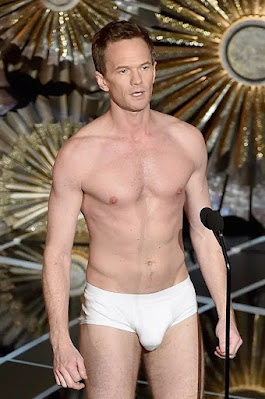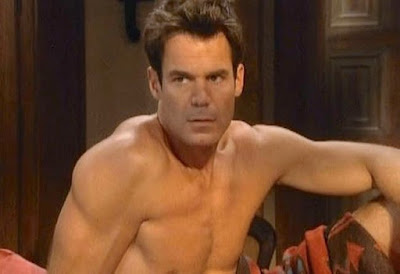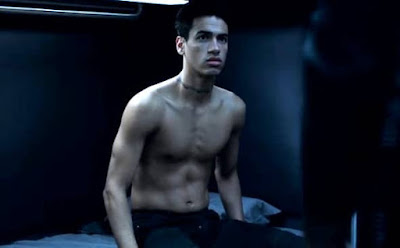Ten years ago, Disney Channel teencoms were mostly about girls who wanted to become pop stars. Now they're usually superheroes. Next up:
Ultra Violet & Black Scorpion: a Hispanic girl gets super powers from a magical luchador mask. I watched Episode #7, which reputedly has a gay character.
Scene 1: A middle aged thug on a motorcycle steals a woman's purse. Ultra Violet, who has violet hair and a violent luchadora mask, turns on her super-speed and retrieves the purse. Fellow luchador superhero Black Scorpion (JR Villareal), who wears a scorpion mask and a muscle t-shirt, apprehends the bad guy.
Angelic music plays as Black Scorpion recognizes the theft victim! He sees her engagement ring, gets all flustered, drops his deep superhero voice, and lets the bad guy get away!
Ultra Violet wants to know what's wrong. "Nothing!" he sputters. "I don't even know Lily." He zaps away.
Scene 2: Family breakfast with Violet, Mom, Dad (Juan Alfonso), and Brother Santiago (Brandon Rossel, left).
The top photo is a different Juan Alfonso, unless he's lost a lot of hair and gained a few pounds.
Violet asks about Lily: she was Uncle Cruz/Black Scorpion's girlfriend, but he wasn't out as a superhero to her, and she couldn't deal with him constantly lying about his activities, so she dumped him.
"That's why he's always so cranky," Violet deduces. "He's single. If we get him a new girlfriend, he'll be easier to live with!"
Brother Santiago suggests that maybe he likes being single, but the rest of the family shoots him down: "No, impossible! To be single is constant misery, whereas people in relationships are in constant ecstasy." That's so stupid, I can't even think of a response. Mom and Dad demonstrate by smooching several times, causing the kids (and me) to become nauseous.
Scene 3: At school, Violet and bff Maya discuss finding Uncle Cruz a girlfriend/ constant ecstasy.
Suddenly angelic music plays as a dreamy boy named Alex smiles at them. "Did you see that?" BFF Maya exclaims. "Alex totally has a crush on you. You should go over and start a convo." Violet dismisses her: "No, that's impossible."
Left: Alex is not listed on the IMDB or the Fan Wiki
Scene 3: In class, the girls notice that Coach Park is female, single/miserable, extremely cranky, and a gym rat. Perfect for Uncle Cruz. But how to get them together? They ignore the possibility that she could be gay.
Scene 4: Home. Mom mentions that she needs to find a substitute gym teacher. Hey, why not hire Uncle Cruz? Then he'll be working with Coach Park all the time. Cruz doesn't want to do it -- being a superhero luchador keeps him busy -- but Mom guilt-trips him into agreeing.
Scene 5: In the school gym, Uncle Cruz is angrily coaching volleyball, and Coach Park is angrily inflating soccer balls. "I can't stand to see him spend another moment as single/miserable," Violet exclaims. "Let's introduce them." But Uncle Cruz refuses to be introduced: "I hate meeting new people."
Scene 6: After class, Uncle Cruz is in the gym, eating a pizza pocket. Maya thinks he looks ok, but Violet insists that he's miserable. In other news, Maya has arranged for them to eat lunch at the table next to Alex from Scene 2, so it will be easier for Violet to move toward getting a boyfriend/constant ecstasy.
But Violet wants to continue matchmaking. Turning into Ultra Violet, she moves around the "wet floor" signs to channel Coach Park into the gym, where Uncle Cruz is now playing basketball by himself. Whoops, the basketball crashes into Coach Park's lunch! Uncle Cruz offers to buy her a new one, but she refuses and storms out.
Guidance Counselor Catalina saw them whole thing, and thinks it's hilarious: "Coach Park is so nasty, she deserved it." She and Uncle Cruz gaze into each other's eyes, eat empanadas. Darn, I thought Cruz was going to end up happily single, to dispute the message that everyone must have a romantic partner.
Mom, who works at the school, spies on them. She is delighted. Finally her brother Cruz will get a girlfriend/wife/constant ectasy!
Scene 7: Home. Violet isn't aware that Uncle Cruz is into Guidance Counselor Catalina, so she continues to strategize ways to push him and Coach Park together. while Brother Santiago tries to ignore her.
Left: Jaylen Moore, who appears in two episodes as the villain Duplitio. I thought this review was a little weak on beefcake.
Scene 8: Violet's next plan: Give Coach Park flowers, and pretend they're from Uncle Cruz. Meanwhile, Maya is happy because Alex from Scene 2 is sending her funny memes. Wait -- I thought Maya wanted Alex for Violet. Sounds like she now wants him for herself.
Mom runs into Uncle Cruz in the faculty lounge, and teases, giggles, and nearly swoons over his newfound girlfriend/ecstasy. I heard enough of that growing up; every time I talked to a girl or mentioned a girl, my parents would high-five each other and congratulate me for finally understanding the Meaning of Life.
Speak of the devil: Guidance Counselor Catalina comes in. She flirts with Uncle Cruz; Mom starts planninng the seating arrangement for the wedding reception.
Then Coach Park comes in, outraged at Uncle Cruz's disgusting, insulting act of...um, sending her flowers? Cruz insists that he didn't do it, but Guidance Counselor Catalina thinks that he's romancing both of them and rushes out. So, she thinks they have a monogamous relationship after one flirtation? She's as bad as Mom, who is already researching preschools for their kids.
Scene 9: Chasing Guidance Counselor Catalina into the hallway to explain, Uncle Cruz runs into Violet, who thinks that her matchmaking scheme worked. He blows up at her: "Stop meddling in my life!"
"But I just wanted you to stop being single/miserable and get a girlfriend/constant ecstasy!" "Well, you succeeded at wrecking my one chance!"
Right, because he'll never meet another single heterosexual woman. There are only two in the world.Scene 10: In her room, Violet muses: "I'm the worst matchmaker ever. Now, because of me, Uncle Cruz will not get either of two single heterosexual women left in the world, and be single/miserable forever!"
Maya counters: "What about you? You're single and miserable, too. Don't you want endless ecstasy? I'm telling you, date Alex! He's cute and smart and funny."
Violet: "It sounds like you have a crush on Alex. That's ok, you take him."
Maya agrees, but no weird matchmaking schemes, please: she'll just tell Alex that she likes him.
Scene 11: Uncle Cruz/Black Scorpion on patrol. Ultra Violet zaps in, wanting to talk about him being single/miserable, but he doesn't want to. He zaps home; Violet follows. "What did I do wrong?" Violet whines. "I just wanted to get you a date with Coach Park, so you wouldn't be single/miserable" "But I'm not interested in Coach Park!" Violet wonders why the person matters; won't any girl provide you with the constant ecstasy?
He admits that he likes Guidance Counselor Catalina, but please don't try any weird matchmaking schemes.
Scene 12: Violet doesn't listen. The next morning she shows up at Catalina's office to do some before-class matchmaking.
Scene 13: In gym class, Violet asks if BFF Maya talked to Alex. She did, and he definitely has boyfriend potential. But not for her, because he's gay. Meanwhile, Catalina asks Uncle Cruz out on a date. The end.
Everyone Must Be Partnered: The message that being single=misery and being partnered=constant ecstasy is odious and destructive. No one disputes the myth except for Santiago, and he is immediately shot down.
Gay Characters; Alex appears in one shot, has no lines, and exists only as an obstacle for Maya. Totally retro. They had the same plot on The Mary Tyler Moore Show in 1972: "I'm not going to be dating your brother because...he's gay."
My Grade: C+.












